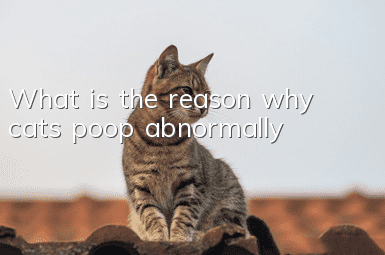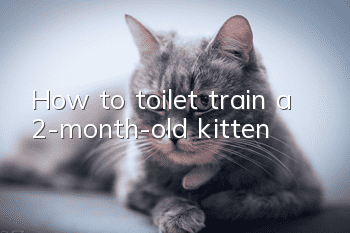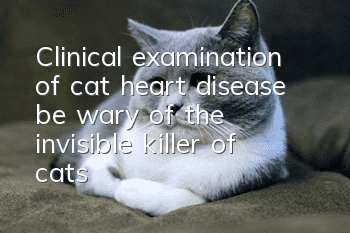What is the reason why cats poop abnormally?

Excretion is a part of the body’s internal material circulation and metabolism that cannot be ignored. However, when raising cats, owners often encounter soft stools or even loose stools. There are many types of symptoms. Generally, owners can easily observe them carefully. It has been observed that the causes of diarrhea and soft stools in cats can be mainly divided into disease factors and non-disease factors. Disease factors are mostly caused by infectious diseases or parasites, while non-disease factors are mainly caused by improper feeding.
1. Disease factors
First of all, for young animals or animals with incomplete immune deworming, when diarrhea or soft stools occur, the possibility of disease must be considered.
1. Viral infectious diseases
The common ones in cats include feline distemper virus. For the babies you buy home, even if the seller says they have been vaccinated, there is no guarantee that they will not get sick, because there is an incubation period for the virus to multiply in the body, and during the incubation period The vaccine will likely not protect. Therefore, after all owners take their newly purchased baby home for observation for a week, it is best to go to the hospital for a booster immunization or an antibody test. If the antibody level is high, it means that the vaccine has a better protective effect on the animal.
2. Parasites
Internal parasite infection is also an important factor causing digestive tract problems in babies. For animals that have not been dewormed, the first thing to consider is infection by digestive tract parasites such as coccidia, roundworms, and trichomonas. Parasites not only compete for nutrients in the animal's body and occupy space in the digestive tract, causing indigestion, but they also run around in various organs in the body, causing great harm, so parents must deworm them on time.
3. Other diseases
Catching a cold can lead to an imbalance of gastrointestinal function. If the weather changes and you do not pay attention to keeping the cat warm, the cat can catch a cold. Severe cold can lead to gastrointestinal dysfunction and gastrointestinal dysfunction, causing indigestion and elimination of food in cats. The stool is also loose and shapeless. Other diseases that may cause diarrhea, such as gastroenteritis, pancreatic dysfunction, thyroid dysfunction, etc., should also attract attention. However, these diseases usually show other symptoms besides diarrhea. Owners should take their babies to the hospital after discovering them. A hospital examination will confirm the diagnosis, and then the specific situation will be analyzed in detail.
2. Non-disease factors
In addition to disease factors, there are many reasons that may cause diarrhea or soft stools in babies, such as:
1. Exchange food. The baby's intestinal tract is not adapted after changing the food.
2. Indigestion. Cats may suffer from swallowed hair balls that are not broken down effectively in their digestive tracts.
3. Food allergy or intolerance. The foods with the highest allergy rates are beef, dairy products and fish.
4. Intestinal flora imbalance.
5. Stress. environment gives motivationStress reactions such as stress, anxiety and discomfort with things.
Because cats cannot eat food that is too salty, let alone shrimp, squid, ham sausage and spoiled food. In addition, cats are allergic to irritating foods. If they are fed these foods, they will inevitably have gastrointestinal problems, such as diarrhea, diarrhea, and diarrhea. The stool is unformed. Therefore, it is healthiest for cats to eat specialized cat food. Fish and rice porridge cannot meet all the nutritional needs of cats, and cats are carnivores and cannot obtain nutrients from rice. Moreover, cat food is good for cats’ teeth. Long-term soft food will cause cats to develop dental diseases.
Many owners find that their babies have diarrhea or soft stools and always like to give them some antidiarrheal drugs or antibiotics. This is wrong. Some pharmaceutical ingredients used by humans can cause poisoning reactions in animals. For example, drugs containing acetaminophen can cause poisoning in cats. So please don’t use human drugs on animals without understanding them.
So what should we do? When a cat poops abnormally, parents must first determine whether the situation is serious. If you only have occasional mild constipation, scientific dietary adjustments can also improve this abnormal stool situation. On the contrary, if your pet cat has severe constipation or has had abnormal defecation for a long time. So, as an owner, you should take your cat to the hospital first. If a food allergy is suspected, discontinue that food.
To treat severe constipation in cats, enema, medication or surgery may be required. And the treatment must be completed with the help of a veterinarian. As a parent, you should not give your cat diarrhea drugs casually, let alone give your cat an enema or perform surgery.
- The cat is rolling on the ground and rubbing everywhere
- What will happen if a cat doesn’t bask in the sun?
- What should I do if my cat has a cold?
- What causes cat ears to bleed?
- What is the function of a cat’s whiskers?
- Choose a lively and active cat based on age, appearance and size
- What's wrong with Garfield cat's stool being a little bloody?
- Will kittens suffer from anal prolapse if they have soft stool?
- Do kittens use cat litter themselves?
- Sequelae of heatstroke in cats



